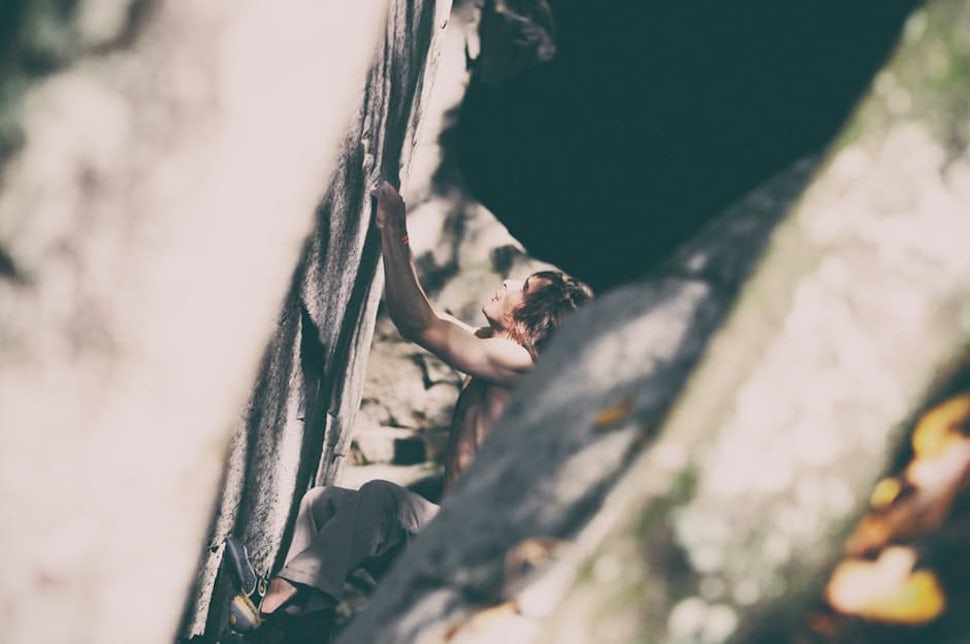Why Rock Climbing is Good for Your Body and Mind
There are countless benefits to rock climbing, both physical and psychological.

Once you learn about them, you'll immediately want to find an opportunity to go climbing. Rock climbing is any situation where you are climbing up a rock – whether at a rock climbing gym, bouldering at spot lower to the ground, or up a rock face, mountainside or ice-covered surface. Rock climbing is intensely physical and takes all of your focus, leading to great relaxation.
Who can do it?
Once believed to be only for adrenaline junkies, with some instruction and practice, rock climbing is actually a great sport for everyone, of all ages and abilities. Many rock climbing gyms have instructors who specialize in working young children, physical and mental disabilities. Whether super-fit or not, you can hit the rock climbing wall and enjoy a great full-body workout. The more you climb, the fitter you will become. Your endurance will naturally increase.
What are the physical benefits?

Contrary to popular belief, rock climbing increases much more than upper body strength. It builds muscle groups in both the upper and lower body including the back, shoulders, abdomen, legs and fingers. Because of the strengthening of core muscles and endurance muscles, rock climbing boosts performance in other sports. For example, performance in racquet sports improves because of the hand strength required to grip the racquet.
Climbing improves cardiovascular health, gross and fine motor coordination and balance. Since you are constantly reaching and stretching for handholds or foot holds as you climb, your agility and flexibility greatly improve. Avid rock climbers do regular stretching after a session, and stretching and strengthening exercises in between sessions to avoid becoming injured.
Rock climbers generally have a lower body mass index and lower body fat. Taking up a climbing routine can be an excellent way to lose weight. One hour of climbing can burn an average of 700 calories..
What are the mental benefits?

Rock climbing is associated with problem solving skills and strategy enhancement. So not only is it hugely fun, but every time you go up a wall or a rock face, you are planning a route and problem solving. Each route is like solving a puzzle, which requires a multitude of skills including patience, visualization, analysis, planning, goal-setting and concentration. Since you must be aware of your body at all times in relation to rocks and pathways, climbers experience increased creativity and memory function. The opportunities to set goals and accomplish them during a climb is limitless and exciting. This naturally builds a sense of accomplishment and self-esteem as you see your ability to rise to a challenge.
Rock climbers experience a lot of euphoric feelings. You become entirely focused on the task and challenges on the climbing wall or rock face, and all other thoughts and stresses fall away. Rock climbing, as most physical activities, releases the neurotransmitter norepinephrine, which helps release stress and block pain for a period of time. The time spent outdoors exposes climbers to more sun and Vitamin D, increasing happiness. Reaching a summit, whether indoors or outdoors, always gives perspective and a rush of adrenaline. Fears that were previously lingering suddenly dissolve. You will immediately start planning to tackle the next challenge in your life or on the climbing wall.
Rock climbing is very social and supportive

It may surprise you, but rock climbing is hugely social since it is necessarily done in pairs. Joining a climbing gym is a popular way to meet climbing partners. Rock climbing is a perfect way to feel a sense of belonging to a community. Whether you are belaying for someone else or climbing, you tend to build strong friendships with your climbing buddies because of the level of communication, attentive listening and trust involved. You automatically learn to put your trust in the person holding the ropes for you. Since one plays different roles while climbing, climbers develop excellent leadership skills.
We want to acknowledge and thank the past, present, and future generations of all Native Nations and Indigenous Peoples whose ancestral lands we travel, explore, and play on. Always practice Leave No Trace ethics on your adventures and follow local regulations. Please explore responsibly!
Do you love the outdoors?
Yep, us too. That's why we send you the best local adventures, stories, and expert advice, right to your inbox.







